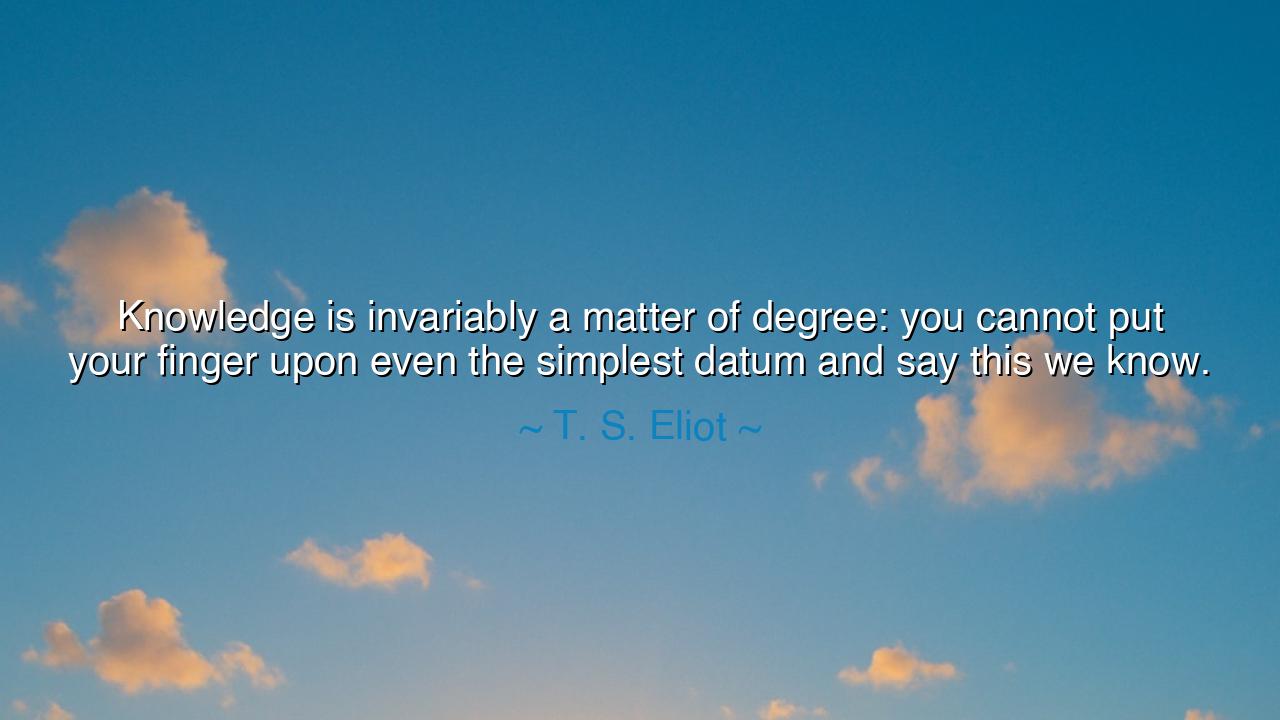
Knowledge is invariably a matter of degree: you cannot put your
Knowledge is invariably a matter of degree: you cannot put your finger upon even the simplest datum and say this we know.






The words “Knowledge is invariably a matter of degree: you cannot put your finger upon even the simplest datum and say this we know” spoken by T. S. Eliot carry the weight of philosophical reflection, revealing the fragile and provisional nature of human understanding. Beneath their precise phrasing lies a timeless truth: that knowledge is never absolute, never complete, and always intertwined with interpretation, context, and perspective. Eliot reminds us that the pursuit of learning is a journey rather than a destination, and that even the simplest truths are layered, complex, and subject to deeper inquiry.
In the style of the ancients, one might hear echoes of Socrates, who famously claimed that true wisdom lies in knowing one’s ignorance. Eliot’s observation resonates with this Socratic humility: to “know” is never to claim mastery, but to acknowledge degrees of understanding, shades of certainty, and the limits of perception. Knowledge is a spectrum, not a singular point, and human comprehension is always evolving. Even the most elementary facts, Eliot warns, cannot be isolated from the web of context, bias, and interpretation that surrounds them.
The origin of this insight lies in Eliot’s dual life as a poet and thinker, immersed in both literature and philosophy. Eliot understood that even language itself is provisional, that meaning is contingent, and that no datum — no word, no historical fact, no observation — exists outside of interpretation. His words challenge the hubris of certainty and encourage the cultivation of intellectual humility, reminding scholars, readers, and seekers of truth that knowledge is never static, but a continual approximation of understanding.
History offers striking parallels to this insight. Consider Isaac Newton, whose laws of motion and universal gravitation shaped centuries of scientific thought. Yet even Newton acknowledged that his understanding was provisional, famously stating, “If I have seen further, it is by standing on the shoulders of giants.” Each discovery built upon prior insight, itself incomplete and imperfect. Eliot’s assertion mirrors this humility: every datum, every truth, is part of a continuum, and claiming absolute knowledge is both impossible and dangerous.
Eliot’s statement also illuminates the epistemic caution necessary in all disciplines. In science, philosophy, and even the arts, one must approach facts and theories with discernment, recognizing that certainty is rare and provisional knowledge abundant. By acknowledging degrees of understanding, one cultivates curiosity, openness, and critical thought. To attempt to “put your finger upon” a datum and declare it known is to ignore the complexity of reality, the interplay of observation, and the provisional nature of human perception.
Dear listener, the lesson is clear: approach knowledge with humility and rigor, recognizing that every fact, no matter how simple it seems, exists within a network of assumptions, context, and interpretation. Question, probe, and reflect, understanding that learning is iterative, cumulative, and never complete. Eliot teaches that wisdom is not in certainty, but in the careful engagement with the partial, the provisional, and the uncertain.
Take this wisdom into your own life: cultivate intellectual humility, verify your understanding, and embrace the provisional nature of knowledge. Pursue learning as a lifelong endeavor, remaining aware that every conclusion is temporary, every insight subject to refinement. By acknowledging the degrees of knowledge, you remain alert, curious, and capable of deeper comprehension, avoiding the trap of false certainty.
Finally, let T. S. Eliot’s words guide both thought and action: knowledge is a matter of degree, not absolute possession. Approach every datum with reverence and inquiry, every truth with caution and reflection. In this way, learning becomes a noble pursuit, one that deepens understanding, cultivates wisdom, and fosters the humility essential for both personal growth and the advancement of society. Even in the simplest truths, there lies an infinite horizon of discovery.






AAdministratorAdministrator
Welcome, honored guests. Please leave a comment, we will respond soon